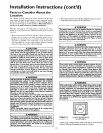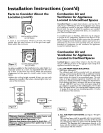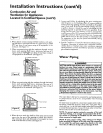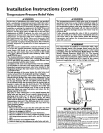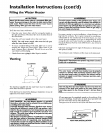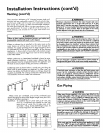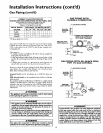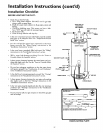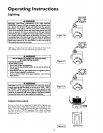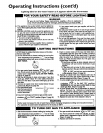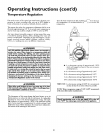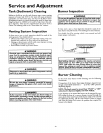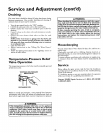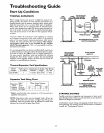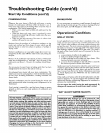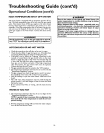
Operating Instructions
Lighting
_,WARNING
BEFORE LIGHTING [PROPANE (L.P.) GAS WATER
HEATERS]: Propane (L.P.) gas is heavier than air. Should there
be a leak in the system, the gas will settle near the ground.
Basements, crawl spaces,skirted areas under mobile homes
(even when ventilated), closets and areas below ground levelwill
serve as pockets for the accumulation of this gas. Before
attempting to light or relight the water heater's pilot or turning
on a nearby electrical light switch, be absolutely sure there isno
accumulated gasin the area. Search for odor of gasby sniffingat
ground level in the vicinity of the appliance. If odor is detected,
follow stepsindicated at "For Your Safety" on the cover page of
thismanual then leavethe premises.
Lighting and operating instructions are located on front of the
wat:r heater, above or to one side of the gas control valve.
_,WARNING
AN ODORANT IS ADDED TO THE GAS USED
BY THIS WATER HEATER.
FOR YOUR SAFETY
IF YOU SMELL GAS:
Do not try to light any appliance.
Do not touch any electrical switch; do not useany phone in
your building.
Immediately call your gas supplier from a neighbor's phone.
Follow the gassupplier_ instructions.
If you cannot reach your gas supplier, call the fire
department.
_,WARNING
DO NOT force the gas control knob. Use only your hand to
push it down to light the pilot, or to turn it to "ON", "OFF"
or "PILOT". Never use a tool such as a lev_, wrench or pli-
er_ Do not hit or damage the knob. A damaged knob may
result in an explosion and serious injury. If you have problem
turning the knob, call the gas supplier immediately.
CHECK FOR LEAKS
Be sure to check all your gas pipes for leaks before lighting your
water heater. Use a soapy water solution, not a match or open
flame. Check the fac,!ory gas,fittings after pilot is lit and gas con-
trol knob is still in PILOT pos!tion;, Then, check the fittings
when the main burner is turned ON . Use a soapy water solu-
tion for this, too.
18
Figure I 0 ]
Figure II]
Figure 12]
I Figure 13]
INNER
i
I
I
OUTER DOOR



